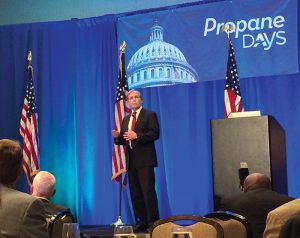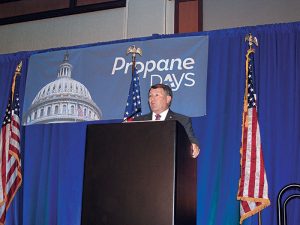NPGA covers four key issues during Propane Days

The legislative and regulatory team from the National Propane Gas Association explains the issues before industry members visit congressional leaders on Capitol Hill. Photos by Brian Richesson
The National Propane Gas Association (NPGA) encouraged propane industry members to focus on four major policy issues during its annual Propane Days lobbying event in Washington, D.C.: tax reform, improvements to propane delivery infrastructure, the Occupational Safety & Health Administration’s (OSHA) crane rule and the funding of federal programs important to the industry.
Tax reform
Ensuring parity among businesses should be a primary objective in tax reform, according to NPGA’s issue brief on tax issues. The association cited four tax-related reforms that could benefit the propane industry:
■ Establishing rate parity for all businesses. NPGA says the tax code should not discriminate between corporations and small businesses.
■ Repealing the estate tax. Repealing the estate tax would help inheritors of family businesses avoid paying taxes upon the owner’s death. According to NPGA, this tax repeal would help continue the industry tradition of family-owned businesses.
■ Ensuring all fuels and technologies have equal access to tax incentives. The propane industry utilized the now-expired alternative fuel tax credit and alternative fuel infrastructure credit. At the same time, it has been left out when competing technologies benefited from credits. The industry seeks a consistent approach across the board.
■ Addressing concerns in the proposed Border Adjustment Tax (BAT). NPGA expresses concerns that if BAT is not implemented perfectly it could harm propane consumers by reducing supply available for the U.S. market. This could lead to disruptions and more price volatility, the association says.
Propane delivery infrastructure

Retired U.S. Navy admiral and former Navy SEAL Eric Olson talks characteristics of team building during his keynote address to Propane Days attendees.
Addressing key issues impacting the transportation and distribution of propane will help protect the 7.8 million U.S. residents who rely on the fuel for home heating, NPGA details in an issue brief.
While a number of infrastructure improvements have been made since the 2013-14 winter, more actions can be taken to help propane marketers deliver fuel to customers without interruption, according to NPGA. Industry leaders are calling on lawmakers to make three infrastructure-related changes that will aid the industry.
■ Ensure more accurate propane supply data from the U.S. Energy Information Administration (EIA). NPGA is pushing for EIA to include export volumes in its days-of-supply calculations, giving policymakers and the industry the most accurate supply picture possible.
■ Hours-of-service waivers. The association would like to see policymakers proactively grant weight limit and hours-of-service exemptions on a regional basis. This would help the industry avoid playing catch-up after a supply chain disruption, NPGA says.
■ Jones Act waiver. Though calling it an extraordinary measure, NPGA says allowing ships to take propane from Gulf Coast storage facilities to needed areas on the East Coast and in New England would be extremely helpful in emergency situations. The Jones Act calls for only American-made ships, staffed by U.S. citizens and sailing under the U.S. flag, to transport goods from one U.S. port to another, and a Jones Act-compliant propane transport ship does not exist. Allowing relief from the Jones Act in certain situations would spell relief for the industry.
Crane rule

“If you don’t send them a message, somebody else will. Don’t be afraid to send the message!”
– Sen. Mike Rounds, R-South Dakota, speaking to Propane Days attendees in Washington, D.C., about visiting their congressional leaders on Capitol Hill.
NPGA is calling on OSHA to further delay the crane rule compliance deadline past Nov. 10 to allow time for changes to the rule.
OSHA finalized a rule in 2010 that would require crane operators working in construction activities to have third-party certification every five years. OSHA delayed the initial compliance date by three years, but the new date is fast approaching. Though OSHA announced in May that it intends to propose another extension, no further details have been provided, according to NPGA.
Rick Roldan, president and CEO of NPGA, sent a letter to OSHA in June to express his concerns about the rule.
“NPGA has long-held concerns with the third-party requirements for crane operator certification, and we believe that an immediate extension to the crane operator certification requirement is necessary to avoid exorbitant and unnecessary costs, which could initially exceed $21 million for the propane industry alone,” he writes.
The Propane Education & Research Council offers a training program that meets OSHA’s general requirements for training a qualified crane operator and provides the means to teach operators how to use cranes safely and effectively. However, it is not considered compliant with the new OSHA regulations, NPGA adds.
NPGA is asking OSHA to postpone the compliance date by at least another three years and grant the propane industry an exception from the rule for routine, propane tank deliveries.
Important programs
The current administration intends to eliminate two federal programs important to the propane industry.
NPGA is asking Congress to maintain adequate funding for Clean Cities and the Low Income Home Energy Assistance Program (LIHEAP), two programs that help the propane industry and the people it serves.
The Department of Energy’s Clean Cities Program aids in the deployment of alternative fuels, vehicles and associated infrastructure. The propane industry has worked closely with Clean Cities to advance the use of propane autogas. To eliminate the program would hinder the alternative fuels marketplace, according to NPGA.
LIHEAP helps more than 6 million households each year – low-income families and seniors – with their energy bills, NPGA reports. Eliminating the program, which has already seen budget cuts of about one-third since 2009, would hamper the ability of low-income families to meet their home-heating needs, the association adds.
















